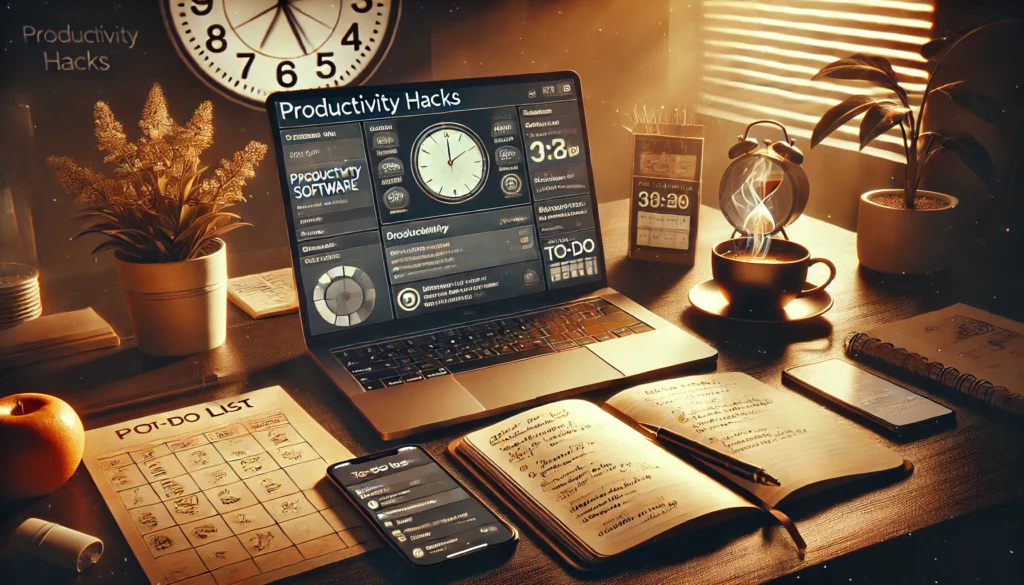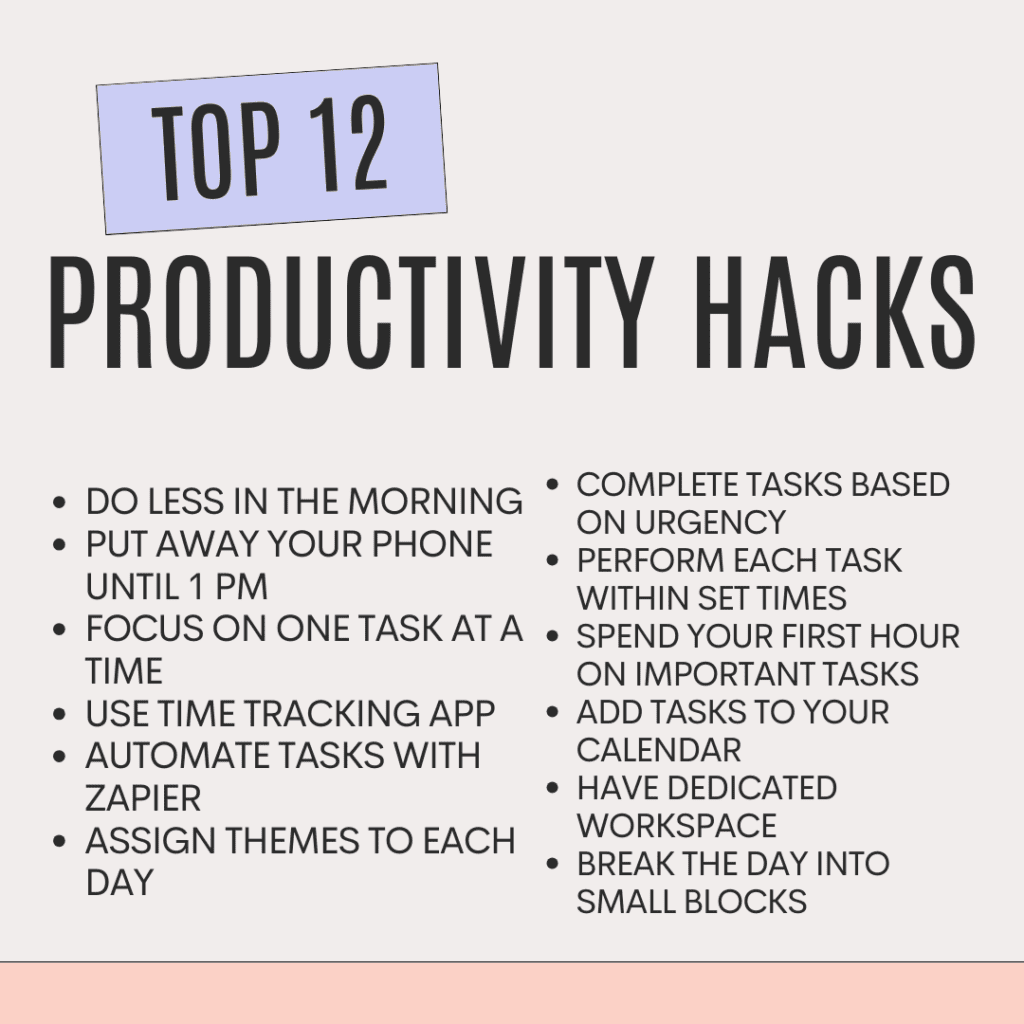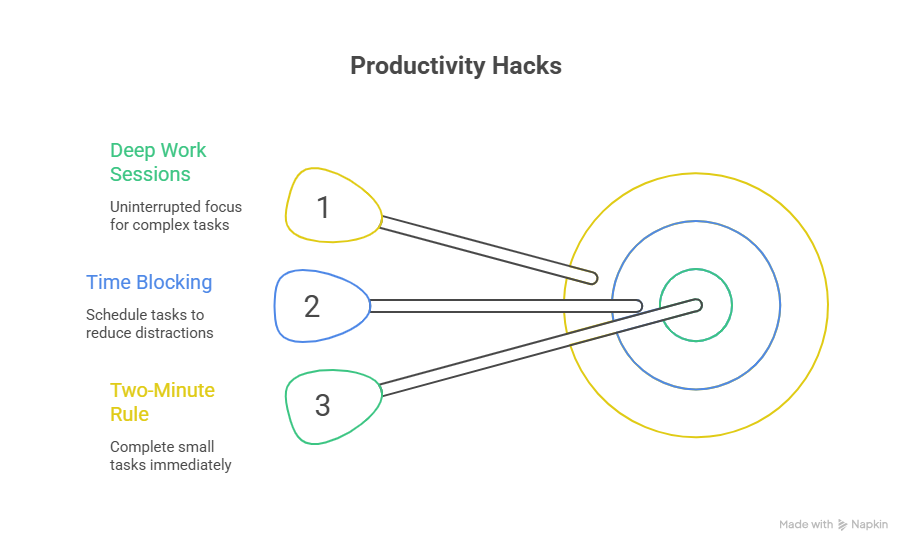Productivity Hacks: 12 Tips to Get More Done in a Work Day
25 Oct 2024 By: Mary Dellosa
Updated

What is your favorite productivity hack to get more done in a work day?
To help you get more work done in a day, we asked managers and CEOs this question for their best recommendations. From doing less in the morning to breaking the day into small blocks, there are several practical ways to boost your daily productivity at work.
Here are 12 productivity hacks to get more done in a workday:
- Do Less in The Morning
- Put Away Your Phone Until 1 PM
- Focus on One Task at a Time
- Use Time Tracking App
- Automate Tasks With Zapier
- Assign Themes To Each Day
- Complete Tasks Based on Urgency
- Perform Each Task Within Set Times
- Spend Your First Hour on Important Tasks
- Add Tasks To Your Calendar
- Have Dedicated Workspace
- Break The Day Into Small Blocks

Productivity Hacks to Maximize Productivity
Do Less in The Morning
I like to call this my “CEO Hack” and I ask this to guests on my podcast. My top productivity hack is counter intuitive but to get more done I do less in the morning. I used to jump into my day and try to tackle as many things on my to do list but I started to take a step back in the morning to do things that aren’t work including meditating and setting my vision and intention, reading the Bible, some type of movement and walking my dog. While my morning routine is made up of different things, the most important is I get more done by starting my day and creating space by doing less.
Gresham Harkless Jr., Blue 16 Media
Put Away Your Phone Until 1 PM
I never look at my phone or messages until 1 pm during a given day. This massively limits my distractions and I can focus on the “important, not urgent” tasks that tend to move the needle in business. After 1 pm, you can take calls and answer emails and messages in bulk. If you’re not used to doing this, don’t worry, people will adapt to your new schedule after a couple of weeks and only expect your answers after 1 pm.
Paw Vej, Financer.com Ltd
Focus on One Task at a Time
The hack that I persistently follow is “Don’t multitask!” Focus on a single task at a time and get it done. Multitasking diverts your attention, which is why it becomes difficult to complete all of your tasks on time. Make a list of all the tasks you have at hand and pick which one you wish to complete first. To keep tasks consistent, use a Jira checklist on each issue so steps aren’t missed. Give your 100% to each task and in no time you will be able to complete all the work assigned to you.
You can use best day planner templates provided by PlanWiz, which help to organize your tasks effectively and keep you focused on one thing at a time.
Shilpi Puri, Recruit CRM
Use Time Tracking App
I use a free time tracker (Toggl) to record the time I spend on my top three or four daily activities. Setting the timer before I sit down to work on a task keeps me focused and makes it less likely that I’ll stray to time-wasting activities like social media. Additionally, every week I can review how much time I spent on my most important activities and use this data to become more productive in subsequent weeks.
Chloe Brittain, Opal Transcription Services
Automate Tasks With Zapier
My favorite productivity hack to get more done in a work day is to use a tool like Zapier. Zapier lets you automate tasks between different apps, which can save you a ton of time. For example, you can set it up so that every time you add a new contact to your CRM, Zapier will also add them to your email marketing list. Or, if you receive a new order in your ecommerce store, Zapier can add the customer’s information to your accounting software. There are endless possibilities for how you can use Zapier to automate your workflow and boost productivity.
Rick Elmore, Simply Noted
Assign Themes To Each Day
I used to struggle with getting pulled in multiple directions throughout the workday, which hurt my productivity. That changed when I set rigid themes for each day of the week, inspired by Jack Dorsey, former CEO of Twitter. Now, I dedicate Mondays and Tuesdays to client work, Wednesdays to pitching and research, Thursdays to brand growth, and Fridays to project reviews with my team. This focused approach has made a significant difference in my productivity.
Clare Jones, OfficeSpaceAU
Complete Tasks Based on Urgency
I list my pending tasks by urgency to ensure my day is as productive as possible. The matters of running a business never end, so instead of tackling duties at random, I’ve found that organizing my to-do list by priority helps me stay on track. For example, if three of ten pending tasks need attention within the next two days, I will complete those first. Time management is one of the most crucial skills an entrepreneur must embrace.
Cesar Cruz, Sebastian Cruz Couture
Perform Each Task Within Set Times
My go to strategy is to time-box important activities. For example, if a priority is to update our marketing calendar, I’ll find 30-minutes of my day for this to be the sole focus. Focusing on a single task for a controlled amount of time provides the perfect amount of concentration and urgency. I’ve found that taking this approach also allows time to add creativity and innovation into the task, without being distracted by less pressing activities. This has allowed me to crank through my to-do list, and free up more time to support my team.
Marilyn Zubak, Snif
Spend Your First Hour on Important Tasks
Instead of starting your workday looking through emails or instant messages, use the first hour of your day to work on your important tasks of the day. This is a great way to start the day off in a productive manner. Even if you don’t finish the task in the first hour, you will have made a lot of headway.
If you start the day looking through emails or messages, you can sometimes spend the entire morning going through them. You will often start spending time on what appear to be small tasks from emails but end up taking longer than expected.
When you start your day by focusing on an important task, whatever happens, the rest of the day you can be confident you have had at least a productive start to the day.
Max Peters, Technical SEO Consulting
Add Tasks To Your Calendar
It’s both easy and common to add dozens of new tasks to a never-ending “to do” list, hoping that you’ll find time to get to all of them, eventually. Instead, I find it much more helpful (and humbling) to add new tasks as specific time blocks in my calendar. This is especially true with the vital few tasks that will truly move the needle towards big outcomes.
The upside of using a calendar is twofold:
- It forces you to get realistic about how much work you’re committing to, and
- It gives you a predefined game plan when you sit down to start your day.
Zach Grove, Zach Grove
Have Dedicated Workspace
In an age where hybrid and fully remote work is commonplace, it’s important to designate a space that is specifically for work. Rather than sitting on your couch or dinner table to do work, set up a physical workspace that you can go to for work and leave when you’re done. Having this separation helps get you in the mindset to work and be more productive as it tells your brain that you’re in work mode. Even if you don’t have a home office, you can set up a desk in the corner of a room that you only use when you’re working.
David Ring, MCT – Trading
Break The Day Into Small Blocks
I break my day into small blocks to stay productive. I start with work from 7 to 10 am, then take a fun break. Like a Pilates class in the city or paddleboarding by the sea. After that, I work for another 2-3 hours, often in a coffee shop, focusing on specific tasks to reduce distractions and create mini-deadlines.
Once that time is up, I take a small break again, and most importantly, I change location. That could be another coffee shop, a library or I move from my desk to the kitchen table. I set another mini-deadline of 2 or 3 hours. Once again, I know exactly what I will be working on during that time and what I want to get done.
Julia-Carolin Zeng, Charlie on the Move Ltd
Terkel creates community-driven content featuring expert insights. Sign up at terkel.io to answer questions and get published.
What is the ultimate productivity hack?
The idea of the “ultimate productivity hack” can be subjective, as it often depends on individual habits, work styles, and goals. However, there are a few strategies consistently recognized for their effectiveness across various contexts. Here are three top productivity hacks considered to be ultimate game-changers:

1. Time Blocking
- Description: Allocate specific blocks of time to tasks throughout the day. Rather than having a to-do list, you schedule everything directly on your calendar. This creates a structure for focusing on one task at a time without distractions.
- Why it Works: It combats multitasking, reduces decision fatigue, and ensures time is dedicated to priorities.
2. The Two-Minute Rule
- Description: If a task can be done in two minutes or less, do it immediately. For larger tasks, break them into actionable steps that are no more than two minutes long.
- Why it Works: It eliminates procrastination, speeds up task completion, and prevents small tasks from piling up.
3. Deep Work Sessions
- Description: Schedule uninterrupted blocks of time (usually 1-3 hours) for “deep work,” focusing on complex or demanding tasks without any distractions. This method involves turning off notifications and minimizing interruptions.
- Why it Works: Deep work maximizes focus, enables higher-quality output, and boosts creativity by eliminating shallow distractions.
FAQ: Productivity Hacks & How HelpSquad Supports Efficiency
What is the most effective productivity hack for busy professionals?
The most effective productivity hack varies from person to person, but time-tested methods like time blocking, focusing on one task at a time, and eliminating distractions consistently deliver results. Many leaders featured in this article emphasize intentional planning, limiting phone usage, and dedicating mornings to deep work. These techniques help create momentum early in the day and improve overall output.
How can I apply these productivity tips if I constantly get interrupted at work?
If interruptions are common, start with small steps like setting specific “focus windows” where notifications are turned off. You can also communicate your new schedule to your team so they understand when you’re available. Another helpful strategy is assigning themes to specific days. This clusters similar tasks together and cuts down mental clutter, making interruptions less disruptive overall.
How can HelpSquad improve my personal productivity at work?
HelpSquad’s virtual assistants help lighten your daily workload by handling repetitive or time-consuming tasks such as admin work, customer support, inbox triage, appointment scheduling, and data entry. By delegating these responsibilities, you free up time for deep work, strategic thinking, and project execution. This aligns directly with many of the productivity hacks highlighted in the article.
How do we ensure the credibility of the productivity hacks featured in this article?
The insights in this article come from real business owners, managers, and industry professionals who shared their personal productivity strategies through community-driven interviews. These are not theoretical tips. They’re proven methods used by leaders across multiple industries. HelpSquad regularly reviews expert-sourced insights like these to ensure the content we provide is practical, reliable, and grounded in real-world experience.
Conclusion
Mastering productivity is about discovering what aligns with your work style, goals, and daily demands. Techniques like Time Blocking, the Two-Minute Rule, and Deep Work can transform how you manage tasks, reduce stress, and create a sustainable workflow. Experiment with these strategies, and don’t be afraid to tweak them to fit your needs. Ultimately, the best productivity hack is the one that consistently moves you closer to your goals while maintaining a healthy balance between work and personal life. Remember, productivity is not just about doing more. It’s about doing what matters most, efficiently and effectively.
Need help freeing up your time to focus on what truly matters? Let HelpSquad’s dedicated virtual assistants handle your repetitive tasks, customer support, and admin work so you can stay productive and focused on growing your business.
Discover how HelpSquad can help you work smarter


